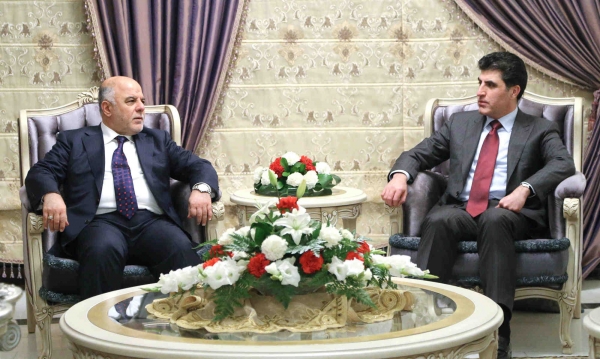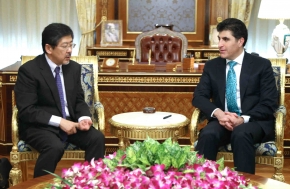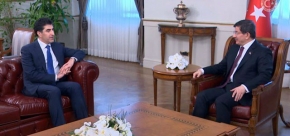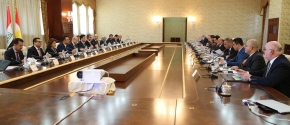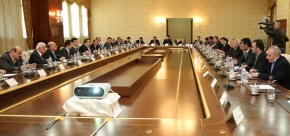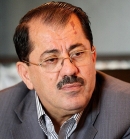PM Nechirvan Barzani speaks in KRG-World Bank conference on Refugees and IDPs
Erbil, Kurdistan Region, Iraq, (gov.krd) – In a conference held in Erbil to discuss the results of a joint programme conducted by Kurdistan Regional Government and World Bank on the impact of internally displaced people on the Kurdistan Region’s economy and society, Prime Minister Nechirvan Barzani stressed the urgent need for additional assistance to address the crisis.
Prime Minister Barzani said, “The presence of close to two million refugees and IDPs has changed the demography of the Kurdistan Region; the population of the Region increased by 28 percent in 2014.” He stressed “The crises has placed a huge burden on the KRG, particularly in the sectors of education, health services, housing and related services, and employment.”
Following is the text of Prime Minister Barzani’s speech:
Ladies and Gentlemen,
Representatives from foreign countries,
Representatives of the World Bank,
Good morning to you all and welcome,
I am pleased to be here with you today to participate in this gathering to discuss the implementation of an important program pertaining to refugees and internally displaced persons (IDPs), and their impact on our Region’s economy and society.
I would like to thank the World Bank for accepting our request to assist in assessing the impact of refugees and IDPs on the socioeconomic life of the Kurdistan Region and the burden on the KRG.
I would also like to thank the KRG Ministry of Planning and relevant KRG organisations for the support they provided in conducting the assessment.
Ladies and gentlemen,
After 2003 the KRG embarked on a wide-ranging programme to achieve stability, economic development, and to improve all sectors in the Kurdistan Region. Some developments were achieved very quickly. Within a short period of time, our Region became a shining example on the map of the Middle East.
Regarding certain important issues and treatment by the Iraqi federal government we cannot deny the fact that we have had difficulties. Unfortunately, the previous Iraqi federal government did not take positive steps toward resolving outstanding issues; indeed, it further complicated the issues.
The impact of the Syria crisis has directly affected the Kurdistan Region. A significant number of Syrian refugees sought safe haven in our Region. Taking into consideration the international principles of human rights, we opened our doors and provided them with refuge and humanitarian assistance.
Due to worsening security elsewhere in the country, Iraqi citizens of all ethnic and religious backgrounds have been fleeing to our Region.
Triggered by overwhelming security events in Anbar, Salahuddin, and later Nineveh Governorates most displaced people arrived during the past one year. When Daesh (Islamic State terrorist organization) assumed control in Mosul and other areas, numerous Iraqi citizens became victims of brutal terror and ethnic cleansing, particularly Christians and Yezidis.
The sudden attacks by Daesh terrorists against the Kurdistan Region with advanced weapons captured from Iraqi army plunged the Kurdistan Region into an unwanted war. The Peshmerga forces performed their duty faithfully and continue to defend the security and dignity of the people of our Region along a frontline of more than one thousand kilometre long.
These crises occurred within a very short time and initially there was no plan on how to confront them. The former federal Iraqi government worsened the crisis. In early 2014 the federal government withheld the payment of Kurdistan Region employees’ salaries and complicated the federal budgeting process. In addition to dealing with humanitarian and security challenges, the Kurdistan Region also faced a serious financial crisis.
The KRG believes the current crisis will end. But today we need the international community to provide major additional military and humanitarian support to our Region.
The presence of close to two million refugees and IDPs has changed the demography of the Kurdistan Region; the population of the Region increased by 28 percent in 2014. The crisis has placed a huge burden on the KRG, particularly in the areas of education, health services, housing, and employment.
I reiterate my call to the international community to take the situation of the Kurdistan Region seriously and to urgently provide additional assistance.
The data and information being presented today by the Ministry of Planning and the World Bank are of great importance to our Region. It will help develop a road map to effectively address the financial and humanitarian challenges facing the Kurdistan Region.
The KRG pays serious attention to this study. Although the findings are not encouraging, it will help us deal with the humanitarian, security and financial challenges we face. This study highlights the impact of the current crisis on health and other sectors. We should deal with the findings carefully. Notably, in some areas the number of refugees and IDPs exceeds the local population.
The existence of such a large number of refugees and IDPs is causing a negative impact on the daily life of our people. Major impacts include price inflation of basic commodities and high unemployment. The people and the government of the Kurdistan Region are under significant pressures.
I am very proud of the welcoming attitude of our people towards refugees and IDPs who have sought refuge in our Region. But we have to be mindful that the KRG alone, with its limited resources, cannot adequately care for the people of the Kurdistan Region as well as refugees and IDPs.
Regrettably, the Federal Government of Iraq has not taken the issue of displaced people in the Kurdistan Region seriously enough. Even though IDPs are all Iraqi citizens, the federal government has not yet adequately addressed their needs. For the KRG to cover their needs, one billion and four hundred thousand US dollars will be needed this year.
I would like to extend my gratitude to the members of international coalition against Daesh, to UN Agencies and international organizations and governments for their support and solidarity in providing humanitarian and military assistance to our Region. We keep in mind, however, that considering the magnitude of the crisis we are in need of major additional assistance.
I would like to express my sincere gratitude to the people of the Kurdistan Region and to the staff of the KRG for their resilience and support during such critical times. Today the Kurdistan Region on the one hand faces funding constraints by the federal government and on the other hand is directly involved in the fight against Daesh.
The people of Kurdistan Region are experiencing a war situation that brings only destruction, calamity, and socioeconomic turmoil.
I also take this opportunity to thank our heroic peshmerga who fight a most brutal international terrorist organization with their limited resources to defend the security and stability of our Region. To effectively continue the fight and to successfully put an end to this war it is essential the international coalition provide our peshmerga with heavy weaponry and advanced military expertise.
It is expected that the fight against Daesh and the Syrian crisis to continue and the crisis facing the Kurdistan Region will not end in the near future. It is likely that more IDPs and refugees will seek refuge in our Region.
To strengthen our capacity to address the humanitarian and security crises it is thus very important to implement effective mechanisms in coordination with the federal government and the international community.
In Iraq, the crises have resulted from inadequate compliance with the constitution, political exclusion, and excessive concentration of political and economic power, particularly during the previous federal administration.
I call upon the current Iraqi Federal Government to take the humanitarian crisis caused by IDPs and refugees seriously and to make it a national priority. From a legal point of view, the onus of responsibility first lies with the federal government. I also urge the federal government to make concerted efforts to obtain international recognition of the crimes committed against Yezidi Kurds as acts of genocide and to play an effective role in the protection of our Christian brothers and sisters.
In the midst of the current challenges we remain committed to efforts that enhance democracy and political stability, and to defend universal human rights, peaceful coexistence, and religious tolerance.
We believe in ourselves and we are determined to build a strong economy. We are for good neighbourly relations with our neighbouring countries as well as to improving our Region. I look forward to the KRG, the World Bank, and the rest of the international community playing more effective roles in alleviating the suffering of all displaced people in the Kurdistan Region.
Once again, welcome to you all. I wish you all success. Thank you.
Erbil and Baghdad reiterate their commitment to the oil agreement
Erbil, Kurdistan Region, Iraq, (gov.krd) – A Kurdistan Regional Government senior delegation, headed by Prime Minister Nechirvan Barzani was received in Baghdad yesterday by Iraq’s Prime Minister Haider al-Abadi and a number of Iraq’s federal government officials. The two sides held two meetings during this one day visit of the Kurdistan Region delegation to Baghdad.
The main objective of the meetings was to discuss the implementation of the agreement reached last December between the Kurdistan Regional Government and the Federal Government of Iraq on oil export and budgetary issues.
During the meeting, it became apparent that due to the financial crisis in Iraq and the lack of liquidity, the Iraqi government is unable to pay the Kurdistan Region’s share of January and February from the federal budget.
The two sides agreed to continue holding further talks in order to find an appropriate solution to the situation.
Regarding the implementation of the December agreement, the Kurdistan Regional Government delegation presented a timetable for the export of oil from the Kurdistan Region, which was accepted by the Federal Government of Iraq. Both sides reaffirmed their commitment to the agreement, while working to settle the immediate problem facing the agreement due to the financial crisis that affects whole of Iraq.
The two sides also discussed the latest developments in Iraq, the war against the Islamic State terrorist organization, ISIS, and the importance of coordination between the Peshmerga forces and the Iraqi Army in the fight against terrorism.
In his visit to Baghdad, Prime Minister Barzani was accompanied by Deputy Prime Minister, Qubad Talabani, the Chief of Staff to President of the Kurdistan Region, Dr. Fuad Hussein, Minister of Natural Resources, Ashti Hawrami, Minister of Planning, Ali Sindi, Minister of Finance and Economy, Rebaz Muhammad and KRG spokesperson, Minister Safeen Dizayee.
PM Nechirvan Barzani receives Japanese Ambassador to Iraq
Erbil, Kurdistan Region, Iraq, (gov.krd) - Kurdistan Regional Government Prime Minister, Nechirvan Barzani, yesterday received the Japanese Ambassador to Iraq, Mr. Kazuya Nashida.
The Japanese Ambassador thanked the Kurdistan Regional Government for its stance and support following the murder of the Japanese citizen in Syria at the hands of the Islamic State terrorist organization, known as ISIS. He conveyed his condolences to the families of the Peshmerga forces who have been martyred in the fight against terrorism.
In another part of the meeting, Ambassador Nashida pointed out that, as part of Japan’s assistance to Iraq, his government will fund an infrastructural project related to the sewage system in Erbil city, which will be officially announced soon. He reaffirmed Japan’s commitment to continuing to help the Kurdistan Region.
The two sides discussed the latest developments in Iraq and the Kurdistan Region, particularly the situation in various battlefields. Prime Minister Barzani highlighted Kurdistan Region’s needs and requirements in its war against ISIS.
They also discussed the latest visit by a Kurdistan Regional Government delegation to Baghdad and the agreement reached last December between Baghdad and Erbil. Prime Minister Barzani told the Japanese Ambassador that Baghdad had officially informed the Kurdistan Region that the lack of liquidity in Iraq is the reason that Iraq is unable to send the Kurdistan Region its allocated share from the federal budget as was finalised in the agreement, last December.
The Prime Minister Barzani thanked the Japanese government for having funded several projects in the Kurdistan Region.
PM Barzani and Turkish Prime Minister discuss bilateral relations between Erbil and Ankara
Ankara, Turkey, (gov.krd) - Turkey’s Prime Minister Ahmet Davutoğlu on Thursday received a delegation from the Kurdistan Regional Government, headed by Prime Minister Nechirvan Barzani.
The two sides discussed the relations between Kurdistan Region and Turkey, stressing the need to further develop and strengthen bilateral relations, particularly in the fields of energy and trade.
The war against the so called Islamic State terrorist organisation, known as ISIS, the role of Kurdistan Region Peshmerga Forces and relations between Erbil and Baghdad, were also discussed in the meeting.
Prime Minister Barzani was accompanied by KRG Deputy Prime Minister, Qubad Talabani, Minister of Natural Resources, Ashti Hawrami, Minister of Planning, Ali Sindi and Minister of Finance and Economy, Rebaz Muhammad.
Kurdistan Regional Government and Kurdish representatives in Iraqi Parliament and Government discuss relations with Baghdad
Erbil, Kurdistan Region, Iraq, (gov.krd) - Kurdistan Regional Government senior officials and Kurdistan Region’s team in Baghdad yesterday held a meeting at the Council of Ministers building in Erbil.
The Kurdistan Regional Government officials presented a comprehensive clarification on the agreement reached between Kurdistan Regional Government and the federal Iraqi government last December on oil export and budgetary issues.
They reaffirmed KRG’s commitment to honour this agreement which became law in 2015’s federal budget.
The Kurdistan Regional Government officials explained the technical constraints which affects the implementation of the agreement as well as a misunderstanding of some terms of the agreement which the Kurdistan Regional Government is working closely with the Federal Government of Iraq to overcome these obstacles and resolve the issues.
They added that there are also some political sides in Iraq that are trying hard to hamper any improvement occur in relations between the Kurdistan Regional Government and the Federal Government of Iraq.
The role of the Kurdish representatives in the Iraqi parliament and government in ensuring that both sides are committed to the implementation of the agreement between Baghdad and Erbil was highlighted and praised.
In the meeting, Kurdistan Region Prime Minister, Nechirvan Barzani, stated that he was ready to visit Baghdad again in order to find common ground and overcome technical obstacles and misunderstandings.
In this regard he instructed a group of Kurdish ministers in the Federal Government of Iraq to open frank discussions with Iraqi Prime Minister, Haider al-Abadi.
The attendees stressed the importance of the implementation and compliance with the 2015 federal Iraqi budget. The Kurdistan Regional Government officials stated that they request the Iraqi government to deal with the Kurdistan Region and its share in line with what was agreed in this year’s federal budget.
More than one plan on how to pay the salaries of Peshmerga and civil servants were also discussed. They stressed that KRG’s current priority is the provision of salaries for its employees.
It was also decided to hold regular meetings every two months. A committee in charge of coordination between the two sides was formed.
PM Barzani: We are fully committed to the agreement with Baghdad
Erbil, Kurdistan Region, Iraq, (gov.krd) - Kurdistan Region Prime Minister, Nechirvan Barzani told the press that Kurdistan Regional Government is committed to the agreement reached between Erbil and Baghdad last December on oil export and Kurdistan Region's share in the 2015 federal budget.
In a meeting held yesterday with representatives of media outlets in Kurdistan Region, Prime Minister Barzani highlighted the technical and political problems and obstacles which stood as impediments to the implementation of the budget law.
Prime Minister Barzani stated that the KRG will exert all its efforts to overcome the problems and obstacles that hamper the implementation of the agreement, adding that the Kurdistan Region’s priority is to resolve the outstanding issues with the federal government and the implementation of 2015 budget law. This is in the interest of the Kurdistan Region and the rest of Iraq.
Prime Minister Barzani said, however, if the Iraqi government was not to honour the agreement, the Kurdistan Region will have no other options but to look elsewhere for solutions. He reaffirmed that the Kurdistan Region has so far honoured its obligations towards Baghdad.
Regarding the Kurdistan Region’s oil policy, the Prime Minister stressed that it is in line with Iraqi federal constitution and that the Kurdistan Region will use all its constitutional rights regarding the oil sector and will not waive its constitutional rights.
He told the press that Baghdad is important for the Kurdistan Region not only in oil field but also in trade, security, military and economic cooperation as well as many other areas, and for this, he is ready to visit Baghdad to find longterm solutions for all the issues.
The meeting with the press was also attended by Deputy Prime Minister, Qubad Talabani, KRG Minister of Natural Resources, Dr Ashti Hawrami, Minister of Culture, Khalid Doski, Minister of Planning, Ali Sindi and the Minister of Finance and Economy, Rebaz Muhammad.
Deputy Prime Minister Talabani highlighted KRG plans on how to address the problems that have emerged as the result of the financial crisis and the war against the Islamic State terrorist organisation, also known as ISIS, in addition to the large numbers of refugees and displaced people who fled ISIS violent repression and took refuge in the Kurdistan Region. He said that the government is confident that the plans to combat these problems will succeed.
The KRG Minister of Natural Resources, Dr Ashti Hawrami briefed the press about the technical aspects of the agreement with the Federal Government of Iraq, reiterating that as stipulated in the agreement, oil is being exported to the Turkish Ceyhan port on a daily basis.
raq’s non-membership in the ICC hinders efforts to recognise ISIS crimes as genocide
A displaced Kurdish Yezidi family in Khanki camp in Duhok Governorate.
Erbil, Kurdistan Region, Iraq, (gov.krd) - Iraq’s non-membership in the International Criminal Court hinders the efforts to internationally recognise the crimes committed by the Islamic State terrorist organization, ISIS, against the civilian population in Iraq and the Kurdistan Region, as genocide.
The Kurdistan Regional Government, KRG’s Minister of Martyrs and Anfal Affairs, Mahmoud Haji Salih, who is also the head of the KRG Committee on International Recognition of ISIS’s Crimes as Genocide, particularly those committed against religious and ethnic groups, reaffirmed this fact. He said, “So far Iraq is not ready to become member in ICC, therefore the legal procedures for the genocide recognition is passing through a difficult path”.
In an interview with KRG website, Minister Salih said, “The main condition for internationally trying the terrorist organization, ISIS, for genocide against Yazidi Kurds and other religious groups, is Iraq’s membership in the International Criminal Court. However, following our committee’s discussions with three Iraqi ambassadors in European countries, we got to the conclusion that Iraq is not ready to become member in ICC”.
He added that Baghdad’s stance on this issue “hinders even local efforts to set up relevant courts in Iraq or Kurdistan Region, since there is no article in the Iraqi laws that refer to genocide. The only solution is to convince the Iraqi government to treat this case individually and approve it with the International Criminal Court so that it investigates the case. For this, great deal of efforts needs to be exerted by the officials representing Kurdistan Region in the Federal Government in Baghdad”, Minister Salih told KRG website.
Following the capture of the city of Mosul and its surrounding areas in June last year, ISIS led mass-killing campaigns against the Yazidi Kurds and other religious groups living in those areas. The Ministry of Martyrs and Anfal Affairs established a centre in the city of Duhok in charge of investigating and collecting evidences of ISIS crimes. The centre has so far documented more than 300 cases, 65 of which are ready to be submitted to the International Criminal Court.
Minister Salih elaborated that the reason why Iraq is not eager to become a member at the International Criminal Court is because its membership entails great deal of responsibilities that Iraq may not be able to shoulder. He added that “if the current efforts did not succeed in recognizing the genocide against the victims of ISIS, then perhaps the UN Security Council can issue a resolution about it or a special tribunal to be established similar to the one established for Rwanda and the former Yugoslavia.”
He also said that the committee he heads plans to send a delegation to Baghdad to consult with the presidencies of the Republic, Parliament, Prime Minister, Foreign Ministry and Ministry of Justice to further discuss this issue.
Minister Salih also criticised those parties and individuals who have been trying, for political reasons, to separate Yazidis form Kurds, speculating that the Yazidis are not Kurds but a different ethnic group.
PM Barzani meets a delegation from the Islamic Republic of Iran
Erbil, Kurdistan Region, Iraq, (gov.krd) - Kurdistan Region Prime Minister, Nechirvan Barzani, received on Wednesday Rostam Ghasemi, head of the Iraqi-Iranian Economic Development Board and his accompanying delegation.
The two sides discussed the relations between the Islamic Republic of Iran and the Kurdistan Region and ways to further develop them in various economic fields, including energy and infrastructure. They stressed the importance of strengthening the level of cooperation and coordination between both sides.
The situation in the region, the latest developments in Iraq and the Kurdistan Region and the war against terrorism were topics discussed also in the meeting.
During his visit, Mr. Ghasemi is also scheduled to meet the Kurdistan Regional Government Minister of Natural Resources and Minister of Housing and Reconstruction in order to hold talks on the possibility of raising the prospects of cooperation between the Islamic Republic of Iran and the Kurdistan Region in the sectors of energy, natural resources, construction and infrastructure.
Shafaghna Talk with the Representative of Kurdistan Region of Iraq in Iran: we Desire no Separation but Confederation Government/ If Maliki go, all Problems will be Solved
Shafaghna- Nazem Dabbagh the representative of KRG of Iraq in Iran frankly knows Nuri Maliki the present main problem of Iraq and believes that if today Mr. Maliki goes, tomorrow Shia, Kurds and Sunni will be unified in Iraq. Although severely criticizing Maliki for not being obedient to the mutual agreements with Kurds, he knows holding referendum a typical work and Kurds’ right while emphasizing that Kurds want no separation, but prefer a confederation government. He mentioned the Kurds’ cases under dispute with Iraq government of which one is the limits of the Region of Iraq already agreed according to the article 140 of the constitutes of Iraq, another is the case of oil that the region thinks it has not completely assigned to it.
He said that Maliki government formed Iraq army with exorbitant costs but employed Ba’ath officers. He added we told him again and again not to do it but he underestimated it. We observed these officers helped ISIS in their recent attacks and betrayed the army. He rejected the claim saying that Kurds helped ISIS in the attack to Sunni areas of Iraq specially Mosul. Dabbagh went on that for ISIS attack and its occupation of a great part of the country, nowadays Iraq is divided into three sessions of Kurds, Shia and Sunni so that the commuting path from the region to Shia areas turns to footpath. Also Shia of Iraq is insisting on to find a solution to the crisis of the country and believes if Mr. Nuri Maliki goes, the agreements among Iraq tribes will be reformed.
Shafaghna reporter in talk with Nazem Dabbagh the representative of KRG of Iraq in Iran put the reason of being powerful of ISIS in Iraq and the operation of KRG and Masoud Barzani’s recent phrases concerning the articale140 of the constitutes and Kurdistan region under discussion.
Nazem Dabbagh Note for Shargh Press/ Iran’s Constructive Role in Iraq
Dr. Zarif’s travel to Baghdad, Najaf and Kurdistan region of Iraq was for making continuation of the Iran and Iraq strategic relations. It is not the first time that the foreign minister has travelled to Iraq; but before the former foreign minister and vice-president of the Iran has travelled to the region and visited the authorities of KR.
Naturally I.R.Iran considers Iraq and KR as important allies having brotherly and friendly continuing. This is interpreted as an historical accompaniment according to common benefits and security. Iran accompanied more than ever at the time of tough fighting of Iraqi different groups against the current dictator and Ba’ath party and did not begrudge any attempt to help Shia, Sunni and Kurds.
Today that the danger of Takfiri and ISIS terrorist groups is felt more than before and the security of the region territorial integrity of some countries are aimed I.R of Iran’s help has increased and turned out to military aids. In this new situation that Kurdish pishmerga forces along with the Army and other Iraqi groups are fighting terrorists the type of communication matters double as much. In the yesterday common meeting of Mr. Barzani and Dr. Zarif, the president of the region emphasized that Iran has been one of those initial countries rushed to help the region in sensible conditions of the battle with ISIS and appreciated I.R of Iran due to the aids of this important country of the region in a special letter on the behalf of the president. The common historical and tribal benefits and ties between Iran and Kurdistan region of Iraq undoubtedly affect and will affect on the strength of present and following relations.
The point that should remembered here is that I insisted in my talks with Iranian and foreign Medias undoubtedly KRG knows itself to be commitment to sustain the territorial integrity and national security of Iraq therefore this is bilateral relation and it is expected that all official authorities and powers with focus on the constitutes get to be obedient to comprehensive collaboration of the region in different processes. The foreign minister of Iran also approved Iran’s support from the being carried out of the agreements between central government and KRG of Iraq yesterday.
Today that in national level changes have occurred among authorities it is expected by all groups that national management thought of Iraq will change. After Saddam’s fall Ayad Alavi, Ibrahim Jafari, Nuri Maliki and now Haydar AL-Ebadi have taken over the responsibility of the prime ministry thus going and coming in responsibilities is a natural work. Whatsoever upon this matter is important is the correction of wrong policies of political actors and strengthen the weaknesses. It has repeatedly been emphasized by experts that the emergence of the phenomena of ISIS Takfiri terrorism results from some discriminations and insularity to apply all national forces aside from tribe, race and religion in administrative responsibilities.
This matter even has caused some respected and honor moves of Shia have dissatisfied with the way of last government and other groups cooperation. Now we expect with new collaborations new thought will lead to conduct the constitution focusing on national unity and to from a comprehensive and organized government to prevent terrorism from rooting. Recently the meetings of Kurdistan representatives with Shia and the prime minister personally coalition has been held and we are optimistic to Iraq’s future. The constructive and effective role of Iran to make cohesion all Iraq’s groups undoubtedly lead to accelerate the reconstructive process of Iraq.
More...
PM Barzani meets Iraqi Parliament’s Oil and Gas Committee
Latest News
- President Nechirvan Barzani in Vienna: Austria aims to enhance diplomatic and trade relations
- Kurdistan Region President meets with President of Austria
- President Nechirvan Barzani meets with Foreign Minister of Austria
- President Erdoğan reaffirms Türkiye’s continued support for Iraq and the Kurdistan Region
- President Nechirvan Barzani’s message on the 126th anniversary of Kurdish journalism
- President Nechirvan Barzani at the Sulaimani Forum: The country must bring us all together
- President Nechirvan Barzani meets with European Union Ambassador
- President Nechirvan Barzani receives French Ambassador
- President Nechirvan Barzani visits Iranian Consulate General to pay respects to victims of Kerman terrorist attack
- President Nechirvan Barzani receives outgoing French Ambassador
- President Nechirvan Barzani condemns terrorist bombings in Iran
- President Nechirvan Barzani meets with US Deputy Secretary of State
- President Nechirvan Barzani’s New Year Address
- KRG Prime Minister Meets with US Deputy Secretary of State
- KRG Prime Minister Engages in Key Talks with UNAMI Chief
- KRG Prime Minister Hosts Diplomats from Iraq and Kurdistan Region
- KRG Prime Minister Meets with the UN’s Secretary-General at COP28
- President Nechirvan Barzani meets with Turkish Ambassador
- KRG Prime Minister Welcomes UK Military Delegation
- President Nechirvan Barzani meets with UK Chief of the Defense Staff’s Senior Middle East Advisor
- KRG Prime Minister Discusses Regional Issues and Domestic Policies in Special Panel
- KRG Prime Minister Meets with Former British Prime Minister
- MEPS Forum in Duhok Highlights Climate Change Among Key Global Challenges
- KRG Prime Minister Meets with United Nations Delegation
- President Nechirvan Barzani and French Ambassador discuss the situation in Iraq and the region
- President Nechirvan Barzani meets with Head of the Independent Strategic Review of UNAMI
- KRG Prime Minister Inaugurates 5th International Trade Fair for Industry and Construction
- KRG Prime Minister Meets Qatar's Consul General
- President Nechirvan Barzani meets with Iraq’s Oil Minister
- KRG Prime Minister Welcomes Cardinal Sako of the Chaldean Catholic Church

